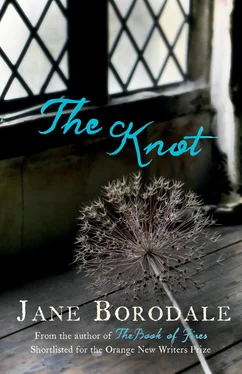1 ...7 8 9 11 12 13 ...19 ‘It would not be seemly to start planting this year.’
Henry raises his eyebrows.
‘It wouldn’t harm to put in some trees, perhaps, come a month or two, but we ought to be getting the soil in better fettle and, as it is, that ground is overbound with clay. There’s still thorough clearing to be done, look at that ashweed, and setting our minds firmly to the shape of it all. We can’t do that if we’re fiddling around with plants already put in, and bits of earth already committed over to being sown or set with slips. It’d be an evil mess in my estimation.’
Henry is thinking that he couldn’t remember asking Mote for his thoughts on the matter.
‘It’s a big job, Master. It’s not just a few dainty pot-herbs in a frame.’
Henry doesn’t need reminding of the scale of his task. He sighs again, louder this time. It’s just that the idea of a desolate unplanted mudbath outside the house for a twelve-month is not appealing. He pictures the rainwater puddling on the walkways and the creep of the most voracious sort of weeds colonizing the blank spaces; thistles, docks, running grasses. And then after almost a year’s worth of decrepitude and neglect, once everything was waterlogged and become prone to yellow mosses and vermin, the frost would descend, unmitigated by any sheltering stalks or the overreach of wintered shrubs; needling down with violent, icy precision to split the lias paving slabs asunder, the earthenware pots he hasn’t bought yet, this very waterbutt.
‘It’ll fly by,’ Mote says, rubbing his hands together, as if it were all settled. ‘Time won’t lie long on us, as for the while we can hoe what comes up, and we’ll get the gang back to turn in the dung after St Martin’s feast in a two-week’s time. We’ll still need a fair portion of the dung over in the kitchen garden as well, remember, Master. It’s what’s needed most for a fair, well-dressed earth.’
‘Are you saying there may not be enough?’
Tobias Mote shrugs cheerfully. ‘And that all depends.’
‘On what?’
‘On whether you carry on with all those roses you’ve got a mind for is the truth, Master. They’re hungry buggers for the dung.’
Henry winces. ‘I see. Well we can buy in more from somewhere, can we?’
‘Probably.’ He chuckles. ‘Though that’ll get them talking.’
He can see that it would. He imagines the gossip at the market; have you heard? They’re buying in shit up at Lytes Cary. He imagines the sucked-in breath and shaken heads. Whatever next? It’ll be all over anyway, come the frosts, for those fancy plants. It makes him annoyed, the way he cares about what other people think.
‘But it’s not just the roses, Master, is it. It’s that we’ve got a ground here that is cold and stiff, which we can make more lively by the digging in of hot dung.’
‘Not near the rosemary,’ Henry adds.
‘Nor the carrots,’ Mote says, thinking of all his duties, ‘the carrots most particular. But the nature of this closed-up soil will be warmed and loosened if we keep on with it. If we can find more dung to see us through this year at least.’
‘I may send word over to the Lockyer’s. They have so many horses at livery they are bound to have a surplus to requirements.’
‘Horse dung is only any use if it has stood a year.’
‘I know that.’
‘Or it burns.’
‘Yes,’ Henry says. What is this goddammed habit Mote has, of trying to teach him all the time.
Over where the plum orchard is to be the Sorcerer shrieks manically, and it still sounds horribly like laughter.
‘We’ll turn in that dung, like you say, and we’ll be half-there already.’ Henry says, and then feels suddenly nettled into resolution.
‘You know what? By spring we’ll be planting in it.’ He claps his hands together. ‘Let’s get cracking.’
Tobias Mote looks startled. He chews a corner of his grimy thumb and then nods secretly, imperceptibly to himself as if it was all to be expected.
‘I’ve a lot on my hands, then. I’ll need at least another boy to help me, if that kitchen garden up there is to feed more than a nest of starvelings,’ he says. ‘And if it gets too much, well.’ He spreads his hands out wide to show the true reach of his feelings, and pretends to yawn, his grey teeth showing. ‘There’s sundry other gardens in the parish could do with tending.’
This is certainly true.
‘Blackmail,’ Henry says. It’s not as though he hasn’t already considered the situation he could find himself in without a competent gardener. He can’t do this thing on his own. But Henry is definitely bothered by Tobias Mote. He does not match up to expectations. He does not pause between spadefuls of earth and consider the weather evenly and at length. He laughs too much. He has opinions.
Yet he has been here for very many years and knows the soil like one of his family. His father had been stockman here for most of his working life until his death, and Tobias had grown up running in the meadows with the kine. He knows what the very grass on this clay soil tastes like from field to field. He knows about the particular way of the wind here, and the likely pattern of rain and the sheltered places. He’d first learnt his gardening from his mother, whose patch was the most burgeoning in the village, and a husbanding man called Colleyns, who he had gone to as a boy about sixteen when he knew he preferred pears to driving cattle down to the other side of Pricklemarch Bridge, say. Tobias Mote has been gardening this soil at Lytes Cary for nigh-on thirty years. Henry knows that he would be foolish to deliberately lose a man’s skills just like that.
‘Would another four shillings a year make all the difference to your sense of optimism about this project?’
‘It would,’ Mote says to the sky in general, without a trace of irony, without turning round.
Some little brown thing is flicking up leaf mould – a wren, a mouse – they look the same sometimes from the corner of one’s eye. That reminds him, he needs to set traps tonight. As soon as the cold weather comes, mice are all over the house, getting into the pantry, the stores, behind the panelling.
‘Master?’ Tobias Mote scratches his neck, then stops.
‘What?’ Surely to God he won’t ask for more.
‘It’s just that there’s a bit of talk going about. Not much, only a word or two. I just was wondering …’
‘What?’ Henry says coldly.
‘If you knew of it, and if there is a way it might be stopped.’
Henry is in no mood to discuss family matters with his gardener. ‘I have heard nothing about anything,’ he says, ‘and do not care for it.’
‘You don’t care to know what they are saying?’
‘I do not listen to the wigwag of idle tongues.’
‘Alright.’ Mote shrugs in a way that suggests he will try again later, and carries on with his spade. ‘It’s just that—’
‘No!’ Henry rounds on him. ‘There is too much to do today for all this. Far too much.’
‘I’m going for my dinner soon,’ Mote warns him, unnecessarily. ‘It’s already late.’
And so it is. The day passes very quickly, and it seems no time at all before a fat, white moon has shot up into the sky with startling rapidity, shrinking as it does so, and its gaze seems harder, more judgmental, up there above the alder, than it had all vastly soft and gaping down on the horizon. Tobias Mote goes off down the path towards Tuck’s, he is small and spry and lithe. He is not at all what Henry imagines a gardener to be. This vexes him more than he can put into words, but he tries anyway, complaining to his wife over meals and in bed.
‘A gardener should be big-handed, slow, move steadily like a root moves in the soil, not flitting quick and tense between the beds, perspiring freely, energy bounding out of him with every springing step. Damn it, Frances, that man almost crackles about the garden. Will that be bad for the plants?’
Читать дальше












